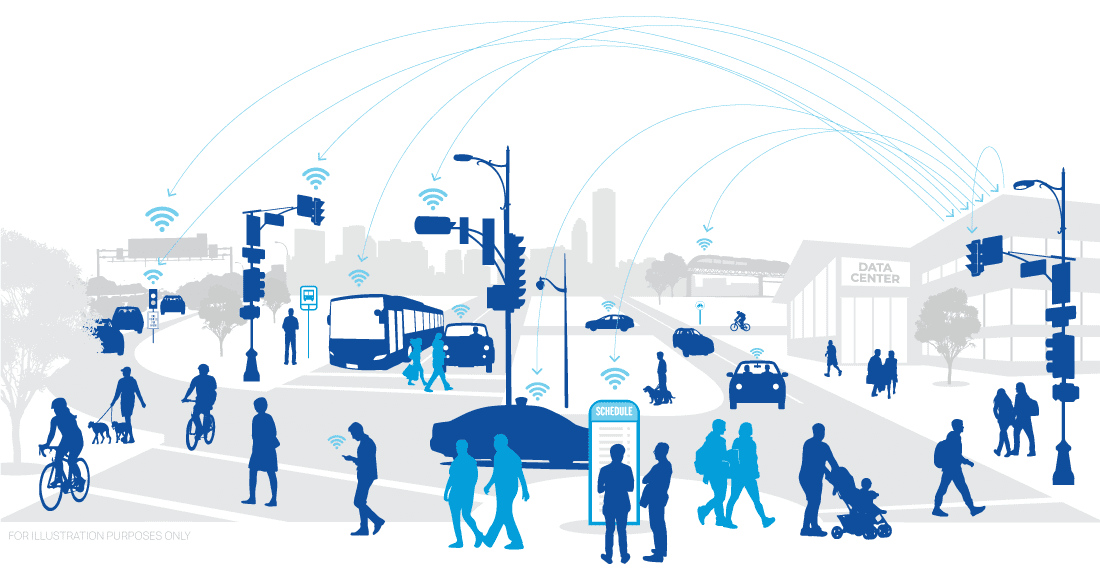Advanced Technologies
Overview
The Advanced Technologies project is one of the six ground-breaking projects that make up Contra Costa Transportation Authority’s (CCTA’s) INNOVATE 680 program. This program is specifically designed to unify existing systems within the corridor and increase efficiency by addressing long-standing operational challenges and corridor-wide congestion on Interstate 680 (I-680) in Contra Costa County. Similar congestion management concepts are in operation around the world and could provide great relief to travelers in our area.
Our Advanced Technologies project will develop a central command center for the corridor. The countywide connected data center will collect traffic data, regulate traffic by adjusting technology, and share information with partners and travelers in real time. All INNOVATE 680 projects are underpinned by the data gathered as part of the Advanced Technologies project.

Countywide Connected Data Center
The countywide connected data center is at the core of the Advanced Technologies project. It will house data gathered from other transportation agencies, transit providers, local agencies, high-tech infrastructure, and external partners. This data will:
- Guide system decision-making
- Adjust traffic signals, speed limit signs, and lane-use signs to absorb the impact of traffic events
- Alert travelers to changes that may affect their journey via mobile app, roadside electronic message boards, and transit station signs
Coordinated and Adaptive Strategies
The Advanced Technologies project is paving the way for the use of future integrated systems to help manage I-680 and arterial roads in synchrony. There are two strategies that we are exploring:
- Coordinated Adaptive Ramp Metering (CARM) – These metering traffic signals on freeway on-ramps control the timing and frequency of vehicles entering the freeway, which reduces congestion and prevents large groups of vehicles from entering all at once. Managing the flow of traffic entering the freeway is a simple way to reduce the potential for accidents, smooth traffic flow, and establish more consistent and reliable traffic times.
- Coordinated Adaptive Traffic Signals (CATS) – Adaptive traffic signals adjust, in real-time, in response to current traffic conditions. The signals use hardware on the roadway to detect vehicles, bicyclists, and pedestrians, which then prompts adjustments to traffic signals. This strategy can reduce the number of times vehicles stop at traffic signals and the amount of time they wait at a red light by another 10% compared with traffic signals that function on a fixed schedule.
It Starts with Good Data
Many advanced technologies that predict or improve traffic flows rely on detailed traffic data. CCTA is currently testing a new tool to collect that data called the Infra-Red Traffic Logger (TIRTL).
TIRTL provides the highly accurate traffic performance information necessary to support CARM and other smart freeway elements. In mid-2021, CCTA and Caltrans District 4 had TIRTL installed at two locations along southbound I-680 to assess the technology. Watch the video to see how TIRTL accurately detects traffic—and is helping CCTA expand its Advanced Technologies tool belt.
Goals
BETTER TRAFFIC FLOW
Reduced travel time, fuel consumption, and vehicular emissions
GREATER SAFETY
Fewer accidents and faster responses from emergency responders
IMPROVED RELIABILITY
A resilient system with more predictable trips and less motorist stress
INFORMED DECISIONS
Information supporting travelers’ choices about their travel time, mode, and route
In Practice
In San Diego—one of the first places to integrate smart traffic infrastructure, services, and management along a major corridor—travelers saved 1,403 person hours each day during peak periods. Benefits were greatest during high congestion due to major incidents. Projects under the umbrella of advanced technology are benefiting travelers nationwide:
- Varying speed limits to better meet traffic and road conditions reduced crashes caused by low visibility by 50% in Virginia.
- Adapting traffic signals on arterials reduced travel times by 20-50% in Arizona and reduced intersection delays by 20% in Maine.
- Notifying traffic signals of approaching buses reduced late arrivals by 40% in Utah.
- Ramp metering reduced delays by nearly 50% in Minnesota and reduced odds of collisions by 6% in Florida.
- Warning drivers of work zones and providing alternative routes reduced accidents by 44% in Texas.
Project Status
Regular stakeholder engagement and public outreach will occur throughout the project. Our team is working diligently to meet several milestones between now and 2024, including:
- FINALIZE and adopt a Concept of Operations document and begin its implementation.
- CONDUCT environmental studies and produce an environmental document.
- BEGIN the design phase.
For more info about this project, contact: